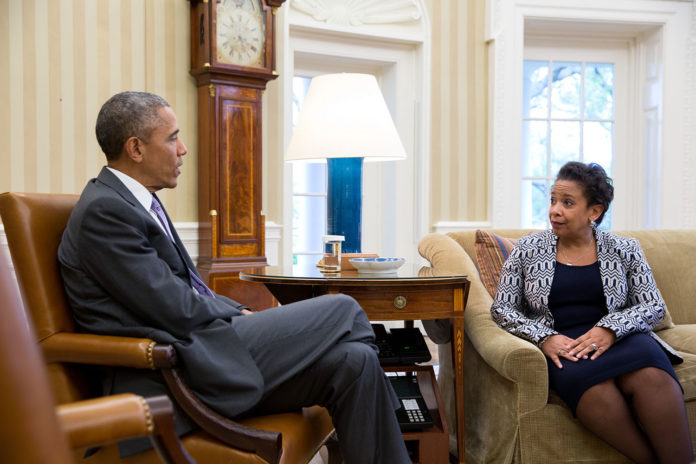On Thursday, former US attorney general Loretta Lynch, who was appointed by former President Barack Obama in 2015, seemed to be making her position clear on the case of Russian lawyer Natalya Veselnitskaya who gained entry into the US in 2015 and met with Donald Trump Jr. during the 2016 presidential campaign.
Earlier on Thursday, addressing the press in France, President Trump took the opportunity to blame the Justice Department under Lynch as well as the Obama administration for allowing Veselnitskaya into the US.
A spokesman for Lynch, in a statement, said that she “does not have any personal knowledge of Ms. Veselnitskaya’s travel.”
In his comments to the press in France, Trump said that Lynch’s Justice Department is reported to have allowed Veselnitskaya a special immigration waiver to allow her to defend a Russian firm based in New York, facing an asset forfeiture case.
According to the New York office of the US Attorney, following the rejection of her visa application, Veselnitskaya was allowed into the US on an immigration parole grant in October 2015.
Recently disclosed court documents show that as Veselnitskaya’s grant was nearing its end in January 2016, she attempted to get an extension on her stay. The US attorney told the judge at the hearing that the special visa given to Veselnitskaya was a “discretionary act that the statute allows the attorney general to do in extraordinary circumstances.”
In a hearing in January 2016, Assistant U.S. Attorney Paul Monteleoni described to the judge the immigration parole grant that had been given to the Russian lawyer, “In October the government bypassed the normal visa process and gave a type of extraordinary permission to enter the country called immigration parole.”
“That’s a discretionary act that the statute allows the attorney general to do in extraordinary circumstances,” Monteleoni said. “In this case, we did that so that Mr. Katsyv could testify. And we made the further accommodation of allowing his Russian lawyer into the country to assist.”
While not getting down to the specifics, Lynch’s spokesman said about the case, “The State Department issues visas, and the Department of Homeland Security oversees entry to the United States at airports.”
While Veselnitskaya was given the special immigration parole to defend Russian businessman Denis Katsyv’s company against an asset forfeiture case by the DOJ in New York City, she ended up participating in a range of pro-Russia lobbying activities.
After magically reappearing in the country in spring 2016, Veselnitskaya is believed to have met with a number of current and former lawmakers and senior officials from both parties. A CCTV video that has recently surfaced shows Veselnitskaya seated in the front row of a Russia policy hearing of the House Foreign Affairs Committee.
Later in June 2016, Donald Trump Jr., then campaign manager Paul Manafort, and the president’s son-in-law Jared Kushner, met with Veselnitskaya. According to emails published by Trump Jr. on twitter, Rob Goldstone, a music publicist, convinced him that the Russian lawyer had damaging information on Hillary Clinton.
However, Trump Jr. has reiterated that the Russian lawyer only spoke about changes to the Magnitsky Act, which imposed sanctions on Russia in return for human rights violations.
Democrats, on the other hand, seem to be rejoicing on the new report, calling it strong evidence that the Trump campaign tried to collude with Russians.
At the press conference in France, Trump said, “She was here because of Lynch.” He added, “Nothing happened from the meeting. Zero happened from the meeting, and honestly I think the press made a big deal over something that many people would do.”





























